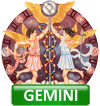 | Sceptrum |
| Period: | |
| Sign (longitude): | d Gemini 05°37 |
| Constellation: | 53 - Eridanus |
| Declination: | -14°15'16 |
| Right Ascension: | 4h39'23 |
| Latitude: | -36.0031 |
| Spectral class: | K4 |
| Magnitude: | 4.0 |
| Calculate Sceptrum in the natal chart | |
Sceptrum is not part of an ancient myth but was named during the Renaissance period by astronomer Johannes Hevelius. It represents the scepter of the celestial king — a symbol of royal authority, command, governance, and leadership. As a star, it suggests a delegated power: not necessarily ruling by one’s own might but by being trusted with influence, responsibility, and honor. Its symbolism carries ideas of trustworthiness, stewardship, wise leadership, and the burden of high office.
Positive Influence
- Honor through service: There is a natural ability to rise to positions of leadership where one serves a greater cause or represents others.
- Delegated authority: These natives are often chosen to hold responsibility because of their reliability, wisdom, and tact.
- Noble demeanor: A quiet dignity often surrounds the person, making them respected by others without excessive self-promotion.
- Mentorship qualities: They can naturally act as guides or teachers for others, showing patience and a sense of duty.
- Strategic mindset: Capable of long-term planning and careful, balanced decision-making, especially in leadership roles.
Negative Influence
- Overburdened by duty: They may feel trapped by responsibilities, especially when carrying the expectations of others.
- Lack of personal ambition: Over-identification with “serving the cause” can sometimes result in underestimating personal needs and desires.
- Fear of autonomy: Because Sceptrum grants given authority rather than seized power, individuals might struggle to assert themselves without external validation.
- Hidden resentment: Bearing burdens too long can lead to internalized anger or a sense of injustice if appreciation is lacking.
- Rigid traditionalism: At times, too much respect for “how things have always been done” can block innovation or necessary rebellion.
Behavior Tactics
- Own the authority: Accept leadership roles fully, but also recognize that self-authorization (believing in oneself without outside endorsement) is equally crucial.
- Balance service and self-care: Honor responsibilities but ensure personal well-being isn’t sacrificed in the name of duty.
- Set clear limits: Define what you are willing to carry for others — and where you need to say no.
- Stay flexible: Embrace change and innovation when needed; remember that true leadership evolves.
- Celebrate small victories: Recognize personal achievements even if external validation isn’t immediately forthcoming.
Summary
Sceptrum’s conjunction with natal planets bestows a natural authority, quiet power, and strong sense of duty. It is an energy of trusted leadership, often leading through service rather than domination. However, these individuals must be careful to maintain autonomy, avoid overburdening themselves, and embrace their inner sovereignty rather than waiting for external approval. In the best cases, they become wise leaders, mentors, and figures of enduring respect.
Constellation Eridanus
| Acamar | Theta - Eridanus | a 23° |
| Angetenar | Tau - Eridanus | s 02° |
| Azha | Eta - Eridanus | s 09° |
| Zibal | Zeta - Eridanus | s 14° |
| Rana | Delta - Eridanus | s 21° |
| Zaurak | Gamma - Eridanus | s 24° |
| Beid | Omicron - Eridanus | s 29° |
| Theemin | Upsilon2 - Eridanus | d 00° |
| Keid | Omicron - Eridanus | d 00° |
| Sceptrum | 53 - Eridanus | d 05° |
| Cursa | Beta - Eridanus | d 15° |
| Achernar | Alpha - Eridanus | c 15° |
Share with your friends. +5 to Karma
Articles from the category:



















Comments: